Lasuna
Lasuna dosages: 60 caps
Lasuna packs: 1 bottles, 2 bottles, 3 bottles, 4 bottles, 5 bottles, 6 bottles, 7 bottles, 8 bottles, 9 bottles, 10 bottles

Discount lasuna master card
For details on histopathologic appearance of fibro-osseus lesions high cholesterol foods chart buy lasuna 60 caps line, see Chapter 17. The focus of adipocytes is in the center of the marrow with hematopoietic cells concentrated around the periphery of the cavity, adjacent to the cortical bone (MacKenzie and Eustis 1990). The marrow is hypocellular to aplastic, with atrophy of fat and the presence of amorphous eosinophilic granular material (Cora and Travlos 2014b; Weiss 2010b). In bone marrow samples from affected 666 Toxicologic Pathology humans, the granular material has been shown to stain strongly positive for alcian blue at pH 2. Secondary neoplasia involving metastases from distant organs, invasion from local tissues, or multicentric neoplasms (lymphoma, histiocytic) may also occur in hematopoietic tissue, including the spleen and bone marrow. Identification of the tumor type relies on evaluation of light microscopic features and ancillary tests as appropriate, including immunohistochemistry, immunocytochemistry, and flow cytometry. Primary neoplasms of the bone marrow are considered rare in F344 rats (MacKenzie and Eustis 1990). Histiocytic sarcomas were reported to be a primary bone marrow neoplasm in Donryu rats with an approximate incidence of 4. Benign and malignant mast cell tumors were reported in bone marrow, also from B6C3F1 mice, with an incidence of 0. Definitive hematopoiesis initiates through a committed erythromyeloid progenitor in the zebrafish embryo. Continuation Education Course: Histopathology of the rodent lymphoid and hematopoietic systems. Runx1 is required for the endothelial to haematopoietic cell transition but not thereafter. Variations in the histologic distribution of rat bone marrow cells with respect to age and anatomic site. Use of recombinant human erythropoietin for the management of anemia in dogs and cats with renal failure. Immature erythroblasts with extensive ex vivo self-reneal capacity emerge from the early mammalian fetus. Fate mapping analysis reveals that adult microglia derive from primitive macrophages. Haemangioblast commitment is initiated in the primitive streak of the mouse embryo. Single lineage transciptome analysis reveals key regulatory pathways in primitive erythroid progenitors in the mouse embryo. Flow cytometric analyses on lineage-specific cell surface antigens of rat bone marrow to seek potential myelotoxic biomarkers: Status after repeated dose of 5-fluorouracil. The multiple roles of osteoclasts in host defense: Bone remodeling and hematopoietic stem cell mobilization. Simultaneous measurement of nucleated cells counts and cellular differentials in rat bone marrow examination using flow cytometer.
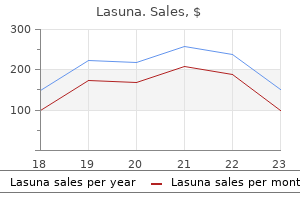
Lasuna 60 caps order
Stark K cholesterol in pasture raised eggs purchase lasuna 60 caps otc, Vainio S, Vassileva G, et al: Epithelial transformation of metanephric mesenchyme in the developing kidney regulated by Wnt-4. Kuure S, Popsueva A, Jakobson M, et al: Glycogen synthase kinase-3 inactivation and stabilization of beta-catenin induce nephron differentiation in isolated mouse and rat kidney mesenchymes. Gai Z, Zhou G, Itoh S, et al: Trps1 functions downstream of Bmp7 in kidney development. McCright B, Gao X, Shen L, et al: Defects in development of the kidney, heart and eye vasculature in mice homozygous for a hypomorphic Notch2 mutation. McCright B, Lozier J, Gridley T: A mouse model of Alagille syndrome: Notch2 as a genetic modifier of Jag1 haploinsufficiency. Vilar J, Gilbert T, Moreau E, et al: Metanephros organogenesis is highly stimulated by vitamin A derivatives in organ culture. Takahashi T, Takahashi K, Gerety S, et al: Temporally compartmentalized expression of ephrin-B2 during renal glomerular development. Eremina V, Cui S, Gerber H, et al: Vascular endothelial growth factor a signaling in the podocyte-endothelial compartment is required for mesangial cell migration and survival. Mittaz L, Ricardo S, Martinez G, et al: Neonatal calyceal dilation and renal fibrosis resulting from loss of Adamts-1 in mouse kidney is due to a developmental dysgenesis. Nakai S, Sugitani Y, Sato H, et al: Crucial roles of Brn1 in distal tubule formation and function in mouse kidney. Verdeguer F, Le Corre S, Fischer E, et al: A mitotic transcriptional switch in polycystic kidney disease. Moreau E, Vilar J, Lelievre-Pegorier M, et al: Regulation of c-ret expression by retinoic acid in rat metanephros: implication in nephron mass control. Ding M, Cui S, Li C, et al: Loss of the tumor suppressor Vhlh leads to upregulation of Cxcr4 and rapidly progressive glomerulonephritis in mice. Xu J, Nie X, Cai X, et al: Tbx18 is essential for normal development of vasculature network and glomerular mesangium in the mammalian kidney. Matsui T, Kanai-Azuma M, Hara K, et al: Redundant roles of Sox17 and Sox18 in postnatal angiogenesis in mice. Pennisi D, Bowles J, Nagy A, et al: Mice null for sox18 are viable and display a mild coat defect. Nikolova G, Jabs N, Konstantinova I, et al: the vascular basement membrane: a niche for insulin gene expression and beta cell proliferation. Lammert E, Cleaver O, Melton D: Induction of pancreatic differentiation by signals from blood vessels.
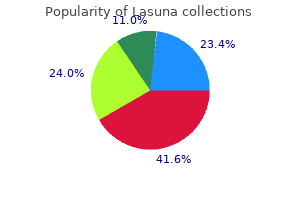
Lasuna 60 caps low cost
A single layer of low cuboidal cells lines the basal lamina at the periphery of the secretory unit and constitutes the germinative layer cholesterol in cell membrane buy lasuna online. As cells proliferate, they move inward and enlarge, taking on a polyhedral shape and accumulating lipid droplets. The composition of sebum is very species specific, consisting of an oily mixture of different cholesterol esters, triglycerides, wax esters, and cellular debris. It is extruded through short ducts lined by stratified squamous epithelium, either into the lumen of the hair follicle or directly onto the skin surface at the mucocutaneous junctions. The waxy secretion of sebaceous glands serves as a lubricant and has antibacterial properties. In some species and in some anatomic locations sebaceous gland secretion is hormonally responsive. For example, the ear of the male Syrian hamster is quite large due to its response to androgens and it is commonly used model for sebum research (Plewig 1977). The innate and adaptive immunologic functions of skin are served by a rich immune surveillance system which is comprised of resident antigen presenting cells (Langerhans cells and dermal dendritic cells), keratinocytes, mast cells, and various bloodderived cells such as T cells and macrophages (Clark 2010; DiMeglio et al. This section will focus on reviewing well-established knowledge about key effector cells in skin as an immune organ, known differences between human and animal models, and known areas where skin immunology can affect development or the toxicity of xenobiotics. Skin immune function varies based on distribution, regional density, and age effects. These cells may participate in various skin defense reactions including hypersensitivity reactions and graft rejection and in the pathogenesis of disease such as psoriasis. Scientists seeking to modulate skin immune function through therapeutic intervention need to be aware of species-specific differences in skin immunologic function between humans and animal models such as mice (DeMeglio et al. Keratinocytes possess immunologic capabilities through their protein secretion capacities and interaction with T cells as antigen irrelevant signal transducers, antigen/superantigen-specific accessory and presenting cells, and as antigen-specific target cells (Nickoloff and Turka 1993; Nickoloff 2006; Strid et al. Activated keratinocytes upregulate the expression of adhesion molecules, such as intercellular adhesion molecule 1, which interacts with integrins on the surface of T lymphocytes. Such activation 1034 Toxicologic Pathology has been demonstrated in various diseases, including psoriasis and hypersensitivity (Salmon et al. Major skin immune cells and their most prominent functions are listed in Table 21. Langerhans cells and dermal dendritic cells are the key players in skin immune function, especially as antigen presenting cells. Langerhans cells are found primarily in the stratum spinosum of the epidermis, and dendritic cells are found in the dermis.
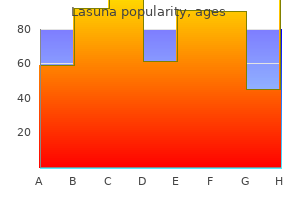
60 caps lasuna purchase otc
Frequent occurrence of polyovular follicles in ovaries of mice exposed neonatally to diethylstilbestrol cholesterol biosynthesis pathway order lasuna. The effects of an aromatase inhibitor and a 5 alphareductase inhibitor upon the occurrence of polyovular follicles, persistent anovulation, and permanent vaginal stratification in mice treated neonatally with testosterone. Hormone/growth factor interactions mediating epithelial/stromal communication in mammary gland development and carcinogenesis. Collaborative work on evaluation of ovarian toxicity 17) Two- or fourweek repeated-dose studies and fertility study of sulpiride in female rats. Increased apoptosis occurring during the first wave of spermatogenesis is stage-specific and primarily affects midpachytene spermatocytes in the rat testis. Concentrations of luteinizing hormone and oestradiol in plasma and response to injection of gonadotrophin-releasing hormone analogue at selected stages of anoestrus in domestic bitches. Disruption of the developing female reproductive system by phytoestrogens: Genistein as an example. Testicular histopathology associated with disruption of the Sertoli cell cytoskeleton. Changes induced by treatment with aromatase inhibitors in testicular Leydig cells of rats and dogs. Letrozole-induced polycystic ovaries in the rat: A new model for cystic ovarian disease. Glandular changes associated with the spontaneous interstitial cell tumor of the rat testis. Impairment of ovarian function and associated health-related abnormalities are attributable to low social status in premenopausal monkeys and not mitigated by a high-isoflavone soy diet. The proliferation in uterine compartments of intact rats of two different strains exposed to high doses of tamoxifen or toremifene. Spontaneous epithelial plaques in the uterus of a non-pregnant cynomolgus monkey (Macaca fascicularis). Spontaneous neoplasms observed in cynomolgus monkeys (Macaca fascicularis) during a 15-year period. Histological observations of the reproductive organs of the male dog from birth to sexual maturity. Effect of long term deprivation of luteinizing hormone on Leydig cell volume, Leydig cell number, and steroidogenic capacity of the rat testis. Olfactory regulation of the sexual behavior and reproductive physiology of the laboratory mouse: Effects and neural mechanisms. Spontaneous degeneration of germ cells in normal rat testis: Assessment of cell types and frequency during the spermatogenetic cycle. Stage-dependent changes in spermatogenesis and Sertoli cells in relation to onset of spermatogenic failure following withdrawal of testosterone. Ovarian and paraovarian squamous-lined cysts (epidermoid cysts): A clinicopathologic study of 18 cases with comparison to mature cystic teratomas. Peroxisome proliferator-activated receptor gamma is a target of progesterone regulation in the preovulatory follicles and controls ovulation in mice.
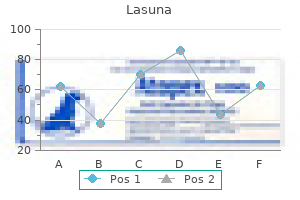
Discount lasuna 60 caps with amex
Therefore cholesterol medication duration 60 caps lasuna order fast delivery, drug-induced injury to other glomerular components, including podocytes or the basement membrane, may secondarily result in mesangial changes, but primary or overwhelming capillary or endothelial damage are not characteristically associated with mesangioproliferative glomerulopathy. The differential diagnosis list includes other forms of glomerulonephritis, which involve basement membrane thickening or inflammation. In mice, it should also be differentiated from hyaline glomerulopathy, which involves loss of all cell components. There is little or no macroscopic lesion associated with this condition, but there may be small increases in kidney weights. As an adverse finding, the clinical relevance of mesangioproliferative glomerulopathy mirrors that of other forms of glomerulonephritis and indicates the potential for immunotoxicologic mechanisms of injury. Mesangioproliferative glomerulopathy can be induced in the rat with the injection of anti-thy-1 antibodies which target the mesangial cells, and so may be encountered by toxicologic pathologists in this and other early drug discovery models of human glomerular disease (Jefferson and Johnson 1999). It is characterized histologically by increased numbers of mesangial nuclei within the glomeruli, with or without an increase in the size of the individual cells. Interactions between mesangial cells, inflammatory cells, and extracellular matrix components perpetuate mesangial cell proliferation and enhance the development of glomerular fibrosis over time. Therefore, with chronic injury and stimulation, mesangial hyperplasia may be associated with an increase in the secretion of collagens, mesangial extracellular matrix proteins, and result in marked proteinuria, where the changes are more properly diagnosed as mesangioproliferative Urinary System 583 glomerulopathy. The presence of mesangial hyperplasia or hypertrophy, therefore, has the potential to signal more serious and potentially less reversible changes in the glomerulus. Mesangial hyperplastic changes are not considered to be preneoplastic lesions and have not been associated with renal tumors. With the exception of increased urine protein in more chronic or severe cases, there are usually no clinicopathologic abnormalities, organ weight, or macroscopic changes associated with mesangial hyperplasia. Mesangial cells share some characteristics with vascular smooth muscle cells, and they increase in number, size, and cytoplasmic volume as a response to many drugs and chemicals such as cadmium (Wehner and Petri 1983; Xiao et al. Specific stimuli such as mechanical shear/ stress phenomenon can induce this proliferative response, but the underlying mechanisms causing mesangial proliferation are incompletely understood. Mesangial hyperplasia occurs commonly with agents that induce hyperglycemia, including the streptozotocin-induced diabetic rat model. It may also result from phospholipidosis, where mesangial hypertrophy is accompanied by lysosomal membrane-bound whorls within mesangial cells as well as podocytes and/or endothelial cells (Wehner and Petri 1983). Other drugs such as growth factor inhibitors or anticancer agents result in the development of inclusion bodies within meangial cells that may also be associated with mesangial hyperplasia. Cell culture studies have shown that mesangial cells both produce cytokines and react to various cytokines, and therefore have the potential for autocrine and paracrine stimulatory effects on themselves as well as from recruited inflammatory cells (Sterzel et al. This suggests that mesangial cell proliferation or stimulation may occur through many routes that eventually affect cell cycle. It is also a frequent finding in diabetic nephropathy, so may be encountered in early discovery efficacy studies such as with the streptozoticin-induced rat model.

Lasuna 60 caps buy on-line
Trauma to the corneal endothelium may allow proliferation of keratocytes with the formation of a fibrous membrane on the inner surface of the cornea (retrocorneal membrane) (Jakobiec and Bhat 2010; Sherrard and Rycroft 1967) cholesterol medication fenofibrate buy lasuna. Slit lamp biomicroscopy allows for a magnified view of structures of the anterior segment and a cross-sectional view of the cornea. As a result, this sensitive technique is frequently used in assessing topical irritation. This in vivo method is used to evaluate the potential ocular irritation of a topical compound or medical device in albino rabbits and has been used less in recent years as in vitro and ex vivo substitutes are used (Curren et al. The in vivo irritation test may be accompanied by use of a fluorescein stain to check for breaks in the epithelial layer (Schmidt 1971). The cause may be a lack of glandular secretion (lacrimal, Harderian, or meibomian), a lack of blinking (lagophthalmos), or a lack of corneal sensation (Kast 1991; Roerig et al. A lack of tear production may be due to inflammation of the lacrimal gland or administration of certain pharmacological compounds. Decreases or alterations in tear production may also occur with a reduction in meibomian gland secretions (Funk and Landes 2005; Pyrah et al. Special Senses 1137 Nonspecific changes in the corneal epithelium include hyperplasia, goblet cell metaplasia, and keratinization. Corneal hyperplasia may be focal, diffuse, or nodular, and is generally not considered to be a preneoplastic finding, but may be a compound-induced finding (Reindel et al. Spontaneous opacities may occur in all laboratory animal species, especially in rats (Carlton and Render 1991a; Mukaratirwa et al. Causes of clinical corneal opacification include stromal edema and the presence of deposits. Edema is a nonspecific alteration characterized by increased thickness of the stroma due to increased interstitial fluid that disrupts the regular arrangement of the stromal collagen. The finding may be accompanied by inflammation and neovascularization, and causes may vary but include compound-induced toxicity (Lock et al. Some deposits are a feature of corneal dystrophy, but others may be due to other causes (Peiffer et al. Corneal dystrophy is a spontaneous, noninflammatory, bilateral corneal change that occurs in several laboratory animals (Moore et al. Microscopically, the finding consists of mineralized deposits along the corneal epithelial basement membrane (Bruner et al. A high spontaneous incidence of corneal mineralization has been reported in Wistar Hannover rats, being greater in males compared to females, with a hypothesis proposed that in response to mineralization, keratocytes become active to play an important role in responding to the mineralized substance (Hashimoto et al. Mineralized deposits in the cornea adjacent to the palpebral fissure are referred to clinically as band keratopathy. The presence of blood may result in a reddish color of the cornea, and an influx of melanocytes or melanin results in brown to black discoloration.
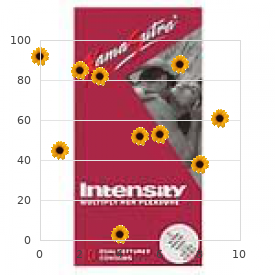
Order 60 caps lasuna with amex
Bone marrow cytologic examination is not needed for evaluation of appropriate changes in erythroid or myeloid cells and/or megakaryocytes in response to increased erythrocyte turnover p-cholesterol-ratio buy lasuna 60 caps without a prescription, inflammation, or platelet destruction/consumption, or if increases in peripheral neutrophils and/or decreases in eosinophils are appropriately attributable to stress (Reagan et al. As peripheral blood lymphocyte counts are not reflective of altered lymphopoiesis, alterations in lymphocyte counts do not necessitate marrow smear evaluation (Reagan et al. Additionally, as decreases in bone marrow cellularity have been shown to be proportional to decreased food consumption or food restriction, changes in bone marrow cellularity concurrent with decreased food consumption or decreased body weight or body weight gain may not require cytologic evaluation (Reagan et al. For rodents and other small laboratory animals, samples for hematopoietic evaluation should be collected from bones with active marrow such as the sternum, rib, humerus, and femur, with the sternum and distal femur most routinely collected. In rats, the distal tibia should be avoided for marrow collection as this site has a lack of active hematopoiesis (Cline and Maronpot 1985). For large laboratory animals, sites of active hematopoiesis that may be collected include rib, sternum, vertebrae, proximal humerus/ femur, and ilium. The central (diaphyseal) portion of the marrow cavity in large animals should not be collected as these areas are usually composed primarily of fat. Also at low magnification, marrow cellularity should be estimated relative to marrow fat, megakaryocyte numbers and morphology assessed, any focal lesions (granulomas or inflammatory foci, necrosis, metastatic infiltrates) identified, and the presence of myelofibrosis determined (Reagan et al. A general estimate of myeloid to erythroid cell proportions (estimated myeloid-erythroid [M/E] ratio) or in rodents myeloid to erythroidlymphoid ratio should be determined, followed by evaluation of the myeloid and erythroid cell lines. Megakaryocytes are evaluated for location, presence of cell clusters, and morphology, including abnormalities such as increased emperipolesis and asynchrony of nucleus-cytoplasmic ratio (dwarf megakaryocytes). Within the myeloid and erythroid cell lines, the maturation and proliferation pools are evaluated for relative proportions, the presence of increased numbers of immature cells or increased numbers of mature cells, synchrony of maturation, evidence of morphologic changes, and neoplasia. Some stages of myeloid and erythroid cells, adipocytes, macrophages, and megakaryocytes are readily identifiable. If needed, cytologic examination may be appropriate, though cytology may also not be able to readily identify stem cells or differentiate between myeloid, monocytic, lymphoid, or erythroid progenitor cells, and additional tests, including flow cytometry, immunohistochemistry, or cytochemistry, Hematopoietic System 651 should be considered (Reagan et al. Differentiation between lymphocytes and erythroid cells is difficult on H&E sections; however, lymphoid follicles are readily identifiable and may be seen in healthy dogs and nonhuman primates (Ito et al. This is particularly important as differentiation between relative versus absolute changes in hematopoietic populations may be difficult on initial histologic examination. For instance, an apparent increase in the estimated M/E ratio may be due to an absolute increase in the myeloid compartment, an absolute decrease in the erythroid compartment, or both. As the cause of the change in the M/E ratio requires correlation with in-life findings, hematology, and examination of other tissues, the histologic findings should be recorded as increased myeloid cellularity and/or decreased erythroid cellularity.
Kerth, 35 years: These durations, determined by the periodicity of spermatogenesis, vary among species and are important considerations when evaluating test compound effects over time in toxicity studies. There were also numerous vesicular lesions noted, and the anatomy was severely distorted due to fibrosis and adhesions.
Jensgar, 40 years: Causes of rhabdomyolysis are many, including trauma, exertion, hyperthermia, sepsis, and toxins. In addition, high proliferative potential colonyforming cell progenitors with multiple myeloid lineage potential and limited expansion capability appear in the yolk sac (Palis et al.
Benito, 65 years: Interspecies and interregional analysis of the comparative histologic thickness and laser Doppler blood flow measurements at five cutaneous sites in nine species. Concentrations of testosterone in canine serum throughout late anestrus, proestrus, estrus and early diestrus.
Mezir, 55 years: The phenotype, spontaneous type 2 diabetes mellitus, is thought to be due to several mutations that are likely in genes that regulate fasting plasma glucose, fasting insulin levels, glucose tolerance, insulin secretion, and adiposity, including the Niddm1 locus on rat chromosome 1 (Galli et al. Induction of melanotic lesions of the iris in rats by urethane given during the neonatal period.
Ballock, 22 years: In general, the first representatives of a given germ cell type in the initial spermatogenic wave are subject to degeneration (S). Apoptosis pattern elicited by several apoptogenic agents on the seminiferous epithelium of the adult rat testis.
Pakwan, 21 years: Metanephric ducts can be identified by the presence of pseudostratified to columnar, slightly basophilic epithelium lining the lumina (Picut and Lewis 1987). Skin effects vary across species; a review of animal models was included in Panteleyev and Bickers (2006).
Stejnar, 53 years: The reproductive system also has several unique features that require special attention, including regulation by hormones from the hypothalamus, pituitary, and other endocrine organs; dynamic age-related changes such as puberty and reproductive senescence; sex-specific characteristics such as cyclicity in the female and stage-aware evaluation of spermatogenesis in the male; and dramatic species differences. Impaired thickening of nonischemic myocardium during acute regional ischemia in the dog.
Merdarion, 32 years: Thus, these waves of hematopoiesis are critical for embryonic and fetal development as well as formation of the adult hematopoietic system. Burns can be treated with topical antimicrobial, such as silver sulfadiazine and mupirocin.
Tragak, 61 years: One day post-dosing (a), the acute changes are noted as increased eosinophilia and hyalinization of the sarcoplasm. Differential diagnosis includes other cysts (eg, Gartner, Skene, and sebaceous cysts), vulvar angiomyofibroblastoma, endometriosis, lipoma, leiomyoma, myeloid sarcoma, myxoid leiomyosarcoma, fibroma, hematoma, angiomyxoma, folliculitis, adenocarcinoma, and squamous cell carcinoma [31].
Sebastian, 33 years: If there is no evidence of fetal cardiac activity or blighted ovum, 69% of patients undergo an uncomplicated miscarriage, which rarely leads to uterine rupture, but intervention, either surgical or medical, may be required in 31% of cases [7]. The simplest form of intercellular fluid accumulation is termed spongiosis in which epidermal cells still remain in contact with each other but the epidermis takes on a sponge-like appearance.
Angir, 24 years: The most common cause is a mechanical obstruction of the uterine tube caused by infection [14] (chlamydia, gonorrhea, salpingitis), anatomic abnormalities, or disrupted transport. Differential diagnoses include reactive fibrosis or scars, benign fibrous histiocytoma, leiomyoma, benign Schwannoma, and fibrosarcoma (Zackheim 1973; Ernst et al.
Tjalf, 42 years: Mesangial proliferation, thickening of basement membranes, and sclerosis are common, and expansion of the interstitial extracellular matrix by fibrosis and increased cellularity also may occur. Squamous cell hyperplasia is a normal adaptive response to skin irritation, and when chronic is seen grossly as a callous.
Bernado, 54 years: Myopericarditis and enhanced dystrophic cardiac calcification in in murine cytomegalovirus infection. Basolateral anion substitutions have minimal effect on the membrane potential, despite considerable effects on intracellular Cl- activity, nor for that matter do changes in basolateral membrane potential affect intracellular Cl-.
Umbrak, 29 years: Even the standard fixative for preclinical studies, 10% neutral buffered formalin, causes artifactual splitting of myelin sheaths. The nodular fibromyxoid change is usually located toward the distal free-edge of the valve leaflet (Elangbam et al.
9 of 10 - Review by Y. Tyler
Votes: 149 votes
Total customer reviews: 149
